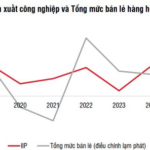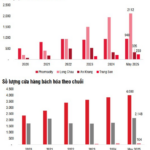The recently issued Government Decree 117/2025 outlines regulations for tax deductions on e-commerce platform sales and tax handling for canceled or returned orders.
According to the decree, e-commerce platform management organizations, both domestic and overseas, are responsible for withholding and remitting value-added tax on behalf of households and individuals conducting business on their platforms for each transaction involving the supply of goods or services in Vietnam.
Additionally, the platforms are mandated to withhold and remit personal income tax for resident households and individuals for each transaction generating revenue, irrespective of whether it occurs domestically or overseas.

In cases of canceled transactions or returned goods, the platform is permitted to offset the tax already paid with the tax arising from other transactions.
The timing of tax deductions is determined as soon as a transaction is successfully confirmed, and payment is accepted. The value-added tax and personal income tax to be withheld are calculated as a percentage of the revenue from each specific transaction.
If it is unclear whether a transaction involves goods or services, or the specific type of service, the highest applicable tax rate will be applied for deduction purposes. E-commerce platforms will be required to declare the withheld taxes on a monthly basis.
Notably, Decree 117 allows for the offsetting of taxes withheld and remitted for canceled or returned transactions with the taxes arising from new transactions. The tax payable by the platform will be determined by the total tax on the transactions for the sale of goods and services, less the total tax on canceled or returned transactions, if any.
The handling of taxes for canceled or returned e-commerce transactions is a matter of concern for many online businesses.
In a query to the Tax Authority, a representative of a household business selling aquarium accessories in Ho Chi Minh City sought guidance on the following scenario: “If an invoice is issued on December 28, 2025, but only a few days later, at the beginning of 2026, the buyer returns the goods, how will the reduction in revenue and tax be handled since it has already crossed over into a new financial year?”
Ms. Pham Thi Minh Hien, Deputy Head of the Policy and International Taxation Department of the Tax Authority, clarified that regarding tax obligations on e-commerce platforms, at the end of 2024, Law No. 56 – Law Amending 9 Laws (including the Law on Tax Administration) was issued, stipulating that e-commerce platforms with direct ordering functions will declare and pay taxes on behalf of households and individuals.
Furthermore, the decree presented by the Ministry of Finance to the Government has provided clear regulations on the amount of tax to be withheld, and the responsibility of the platform in offsetting, declaring, and paying taxes in the event of canceled transactions.
Alongside the responsibilities of the platforms, households, and individuals engaging in business activities on e-commerce platforms are also obliged to declare and pay other types of taxes, such as special consumption tax, environmental protection tax, resource tax, and other charges as stipulated by law.
Moreover, households and individuals conducting business must provide complete and accurate information regarding their tax identification number or personal identification number (for Vietnamese citizens), along with relevant documents, to facilitate the determination of tax obligations by the e-commerce platform management organization.
The Ultimate Showdown: iPhone Dominates Shopee/Lazada’s Best-Seller List, Leaving Galaxy A15 Stranded
Apple’s iPhone dominated the best-selling charts on e-commerce platforms in 2024, skyrocketing phone sales and solidifying its position as the premium smartphone of choice for online-savvy Vietnamese consumers.
The E-commerce Platform to Take Care of Your Tax Obligations: A Seamless Solution for Online Sellers
The recent Government Decree 117 has brought about a significant change in the e-commerce landscape. From July 1st onwards, all e-commerce platforms will be required to withhold and pay taxes on behalf of their sellers. This new regulation is set to revolutionize the way online businesses operate, with potential far-reaching implications for the entire industry.
SSI: Established Businesses Like The Gioi Di Dong, FPT Retail, and Masan Benefit from the Crackdown on Counterfeit and Pirated Goods
According to SSI, one of the notable investment themes for June is the stocks of companies that benefit from the crackdown on counterfeit goods.
Counterfeiting in the Digital Age: Time to Take Action Against Online Marketplaces
“It is imperative to strengthen the penalties and impose criminal liability on both the manufacturers and the e-commerce platforms themselves if they are found to be in breach of regulations. A stringent enforcement approach is necessary to deter future violations and ensure a safe and trustworthy digital marketplace for all stakeholders involved.”





















